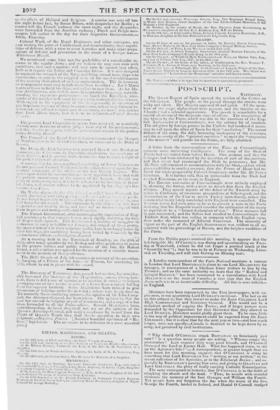A letter from the correspondent of the Times at Constantinople
contains some intereating intelligence. The army of the Shah of Petah' had m/ retired from before Herat. One account said that the besiegers had been reinforced by the desertion of part of the garrison, and that event had encouraged the Shah to persevere ; but Mr. Me Nina. still remained in communication with the Shah,—a fact which gives credibility to another account, that the Prince of Herat had re. fused the terms proposed by Colonel Saonomer, under 31r. AleNetals
direction. It is further said, that an ambassador from the Shah had reached Erzeroom, on his route to Englinal.
The Russian emissaries at Constantinople were actively employed in alarming the Sultan, with a view to detach him from the English alliance. They spread repotts of the defeat of the Ttukish army by rehels in Curdistan, of enurmoua preparations at Sebastopool, and the determination of the Czar to attawk rtatkey inatnediately, unless the commercial treaty lately concluded with England were cancelled. The Russian envoy lied even gone so far as to present a note to the Porte declaring that the Emperor would consider the ratification of the treaty as equivalent to a " formal declaration of war." These menaces had iiipart succeeded; and the Sultan had recalled to Constantinople the Turkish fleet, which was sailing in company with the English squa- dron under the command of Admiral STOEFORIL The necessity of vigour on the part of the English Government was evident to all ac- quainted with the proceedings of Russia, and the helpless condition of the Porte.


























 Previous page
Previous page